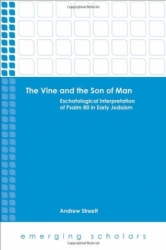Reviewed by James M. Hamilton, Jr.
Andrew Streett’s published dissertation argues for the important influence of Psalm 80 in the Old Testament’s development of the connection between the vine and the son of man. This very technical book from an evangelical engages wider scholarship on its own terms.
Streett’s study is comprised of eight chapters: the first looks at Psalm 80 in its historical context “using historical-critical methods to attempt to find the meaning of the text as it may have been intended by its author and initial audience and performers” (13). Chapter 2 examines the place of Psalm 80 in the canonical text of the Psalter, under the (in my opinion correct) assumption that the whole book has been shaped to promote hope in the future king from David’s line. Chapter 3 examines the points of contact lexical and thematic between Psalm 80 and Daniel 7, arguing that the latter was influenced by the former.
Chapter 4 then moves from the text of the Old Testament into the history of its reception, examining the eschatological interpretation of Psalm 80 in both Second Temple and Rabbinic literature. Chapters 5–7 look at the way that Psalm 80 has been understood in the New Testament, with chapters on Mark 14:62, on the parable of the wicked tenants, and on John 15. Chapter 8 synthesizes the findings of the study.
Streett admirably defines his terms in his introduction, setting forth exactly what he means by allusion, eschatology, eschatological interpretation, Messiah, messianic interpretation, and Christological interpretation. Consider, for instance, his explanation of eschatology: “a wide variety of expectations including return from exile, a restored Davidic monarchy, a reunited nation, rebuilding of Jerusalem or the temple, coming of messianic figures, manifestation of the kingdom of God, judgment of national enemies and the wicked, resurrection from the dead, and a new creation” (2). Such a full accounting rightly assesses the sweep and grandeur of Old Testament expectation.
The breadth and depth of Streett’s study are both admirable. He thoroughly engages the scholarly discussion, demonstrates skill and sensitivity with the primary sources in the original languages, and marshals a forceful argument for his position. He shows that the reference to the nation as the “vine” in Psalm 80:8 and 14 and the “son of man” who is the man of God’s right hand in 80:15–17 “suggests the importance of the king and the restoration of the nation” (47). Placed in the wider literary context of the edited Psalter, “the messianic and eschatological content found in nuce . . . becomes strengthened” (89). His case that “Daniel 7 interprets Psalm 80 eschatologically and messianically” (114) is convincing, as are the demonstrations that Psalm 80 was interpreted in similar ways in extra-biblical Jewish writings. The discussions of the use of Psalm 80 in the New Testament are nuanced and careful, and it is hard to disagree with Streett’s conclusion that Psalm 80 was read “as a prophetic text that predicts the events of Jesus’ life, death, and resurrection or describes the significance of his role as Messiah” (226).
Andrew Streett is to be commended for this admirably successful dissertation. I will not quibble over minor disagreements, such as how the Psalms reached their canonical form, but I will warn Books at a Glance readers: if you plan to engage this study, eat your Wheaties. This is a careful and thorough piece of scholarship. The reality is that such writing must be read slowly and digested, but like the most nourishing food, sometimes that is what’s best for us.
James M. Hamilton Jr. is Professor of Biblical Theology at Southern Baptist Theological Seminary and Pastor for Preaching at Kenwood Baptist Church. He is also the Review Editor for Biblical Theology here at Books At a Glance.
